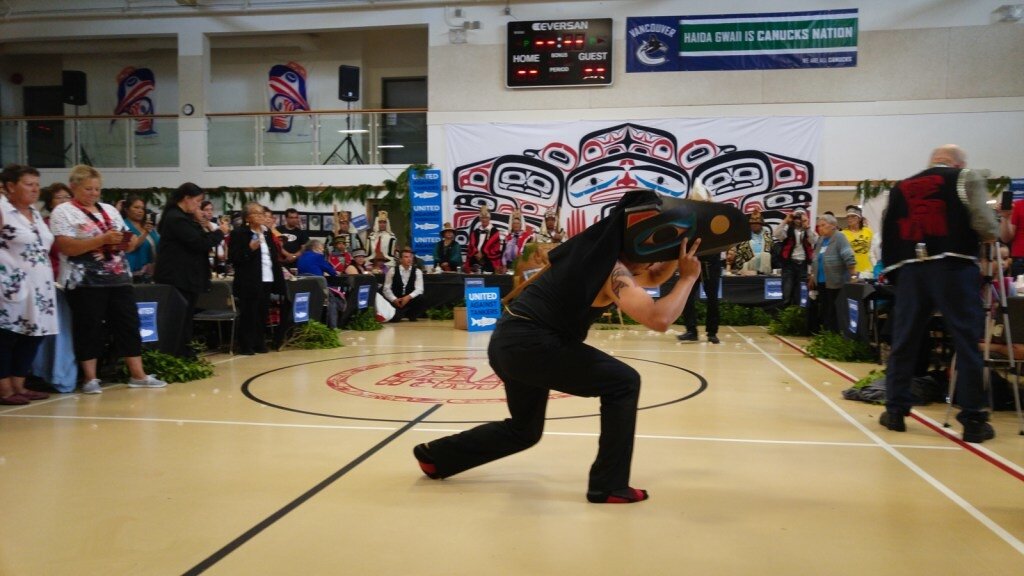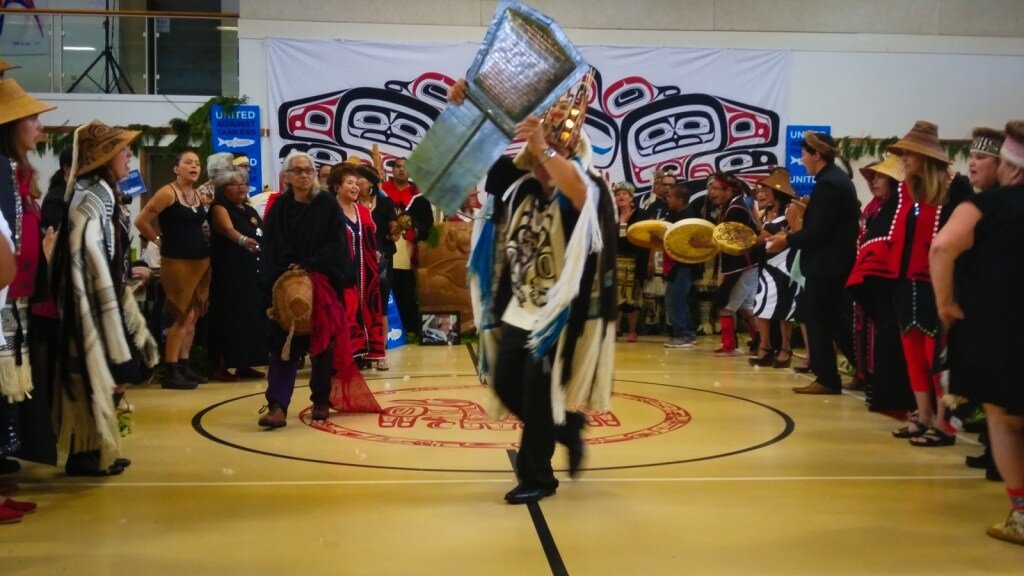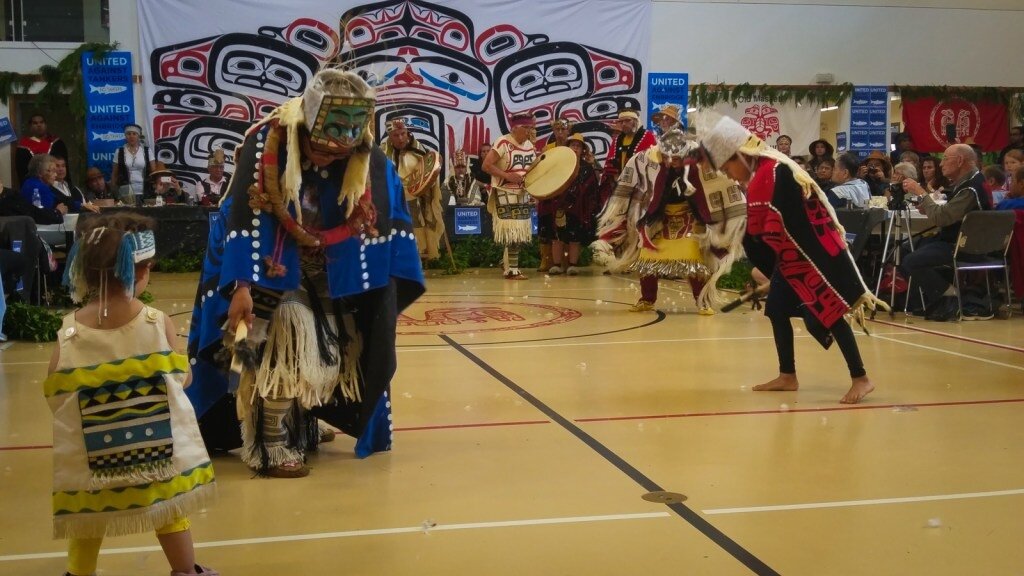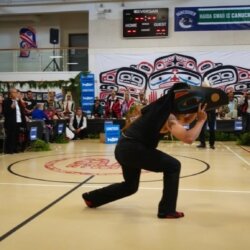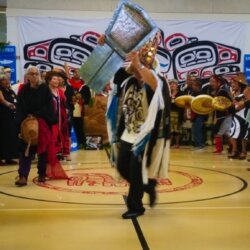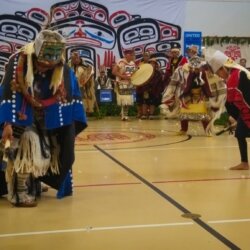What made this Haida clan potlatch so historic?
A clan’s decision to strip two hereditary chiefs of their titles for secretly supporting Enbridge’s Northern Gateway pipeline leaves more questions than answers, and the Haida struggling for unity.
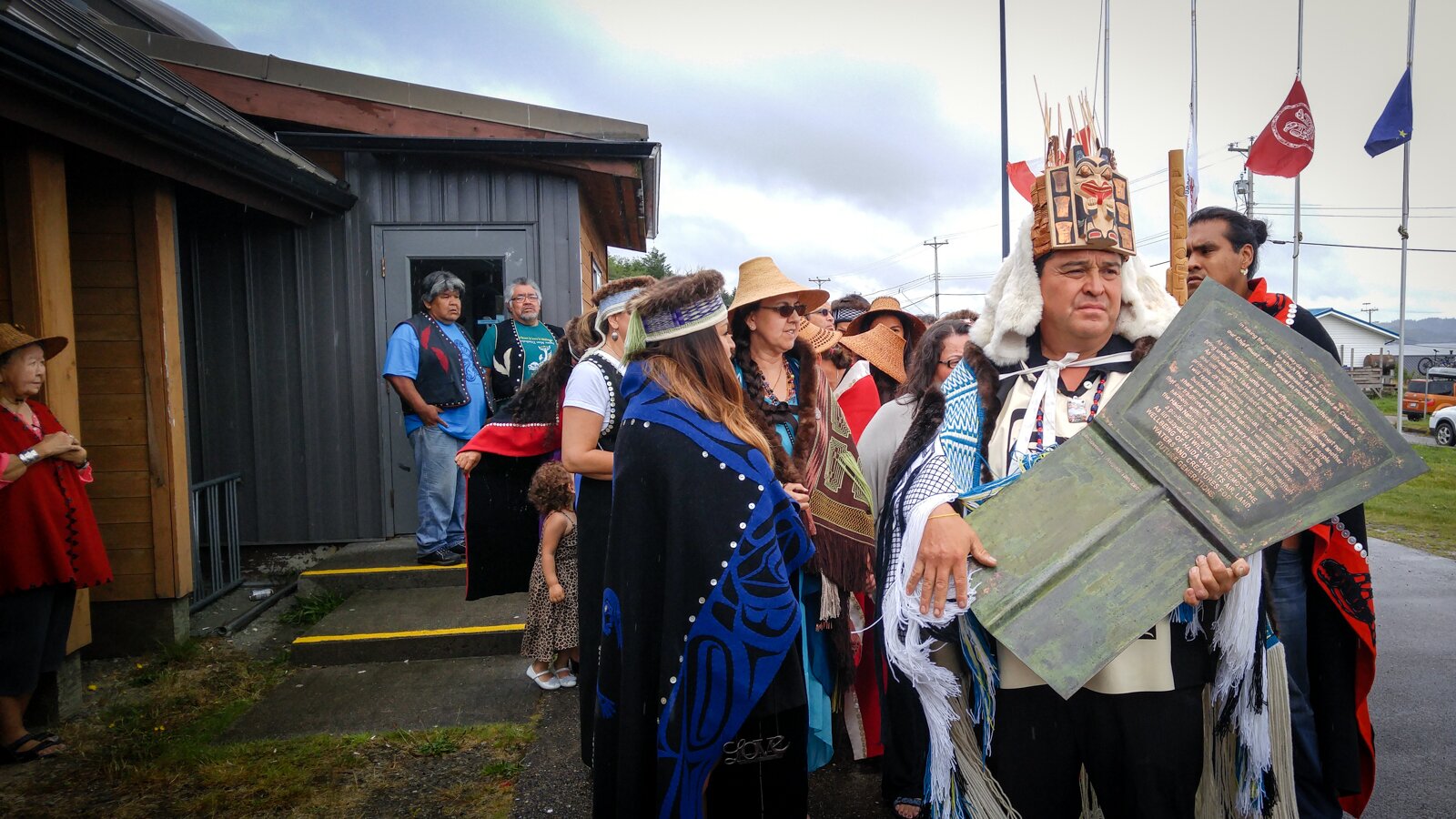
Off the north coast of British Columbia, Haida elders say that thousands of years ago Raven pulled the first people out of a clam shell in the ocean and placed them on the land. The people have fought to defend their lands and waters ever since.
An oil spill, many locals say, would be devastating to the fragile marine ecosystem that has sustained the Haida Nation for generations. But some who are seeking economic development and job opportunities are beginning to think that’s a risk worth taking.
Discourse Media received a formal invitation to attend a traditional potlatch ceremony on August 13, 2016 in Old Massett, Haida Gwaii. The potlatch is central to the Haida’s traditional hereditary system of governance. It is their courthouse, their boardroom and their parliament. It is where Haida business is finalized. But the business conducted on this occasion had not been done in hundreds of years.
The reason for this potlatch? A Haida clan was preparing to strip the names of two hereditary chiefs for secretly supporting Enbridge’s proposed Northern Gateway pipeline — a project the Haida Nation has been fighting in court.
More than 500 guests came to witness the historic event. First Nations leaders from up and down the coast and leaders from nations along Enbridge’s proposed pipeline route flooded into the “Haida House” to show their support. Many share the same concerns as the hosting clan: that an oil leak along the pipeline route or a catastrophic tanker spill on the ocean would cause irreversible harm to wildlife, salmon runs and the environment.

Aunties and uncles whizzed around a massive feast sizzling in the kitchen as clan brothers and sisters ushered in guests. A clan is essentially a large extended family. There are approximately 33 clans on Haida Gwaii, each falling under two main moieties, or kinship groups: Raven and Eagle.
Each clan is represented by a hereditary chief, charged with carrying out the wishes of their clan members. But that’s not how the two chiefs in question went about their business with Enbridge, says head chief Darin Swanson.
“It was done in such a secret fashion,” he said, standing outside the potlatch hall. “I wish they were honest with us and up front with us. We could have worked this problem out together.”
Swanson holds the hereditary chief name Ginaawaan. He led the ceremonial business on behalf of the Yahgu'laanaas/ Jaanas Raven clan. “It was a really tough decision,” he said. “It was the hardest thing me and my clan had to do.”
“They told us they weren’t affiliated with the oil companies. It was a lie to us. So the clan felt deceived and we felt we had to make it right.”
The decision to strip the chiefs of their names, he said, was made in June, but only after weeks of rumours, innuendo and bickering within the clan.
The Yahgu'laanaas/ Jaanas clan began meeting in April 2016 after it was discovered that two of their chiefs, Francis Ingram and Carmen Goertzen, along with other chiefs and members of the Haida Nation, had attended meetings with Enbridge in Vancouver in March without informing their clans. When they came back, the clan wanted answers.
Goertzen was first to be questioned in a clan meeting.
“He was confrontational, very confrontational,” said Georgia Bennett, Goertzen’s cousin. “And I love him dearly. He’s a really good friend of my husband so it’s really heart-wrenching.”
Ingram was next.
“He was asked why he didn’t consult with the clan and he didn’t really give any answers,” said Christine Carty, whose late grandfather held the chief name 'Laanas Sdang before passing it on to Ingram. “It’s very insulting, especially when my grandfather carried that name in such a dignified manner.”
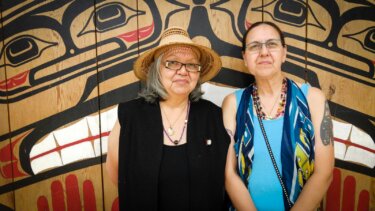
Swanson says the meetings were emotional but unproductive.
“There was nothing definitive on what they were doing, so what could we do as a clan? There was just rumours.”
But rumours quickly turned into evidence when it was discovered that Ingram, Goertzen and six others had signed a letter to the National Energy Board (NEB) urging them to provide Northern Gateway with its requested extension. The group, calling themselves the Hereditary Chiefs of North Haida Gwaii LLP, said the extension would be in “Canada, Alberta and British Columbia’s collective best interest.”
The letter, dated March 22, 2016, was discovered in late June.
“It was embarrassing,” said Swanson. “When they sat in that [clan] meeting, they told us they weren’t affiliated with the oil companies. It was a lie to us. So the clan felt deceived and we felt we had to make it right.”
Swanson and 11 other hereditary chiefs quickly submitted a countering letter on July 1, asking the NEB to “rescind” the initial letter. They pointed out that four of the signatories are “not recognized as potlatched Hereditary Chiefs” and that the four others who are hereditary chiefs “do not collectively represent the communities of Old Massett, Skidegate, the Haida Nation and the Hereditary Chiefs Council.”
Discourse Media reached out to all members of the Hereditary Chiefs of North Haida Gwaii LLP for comment. A representative from the company was not made available for comment.
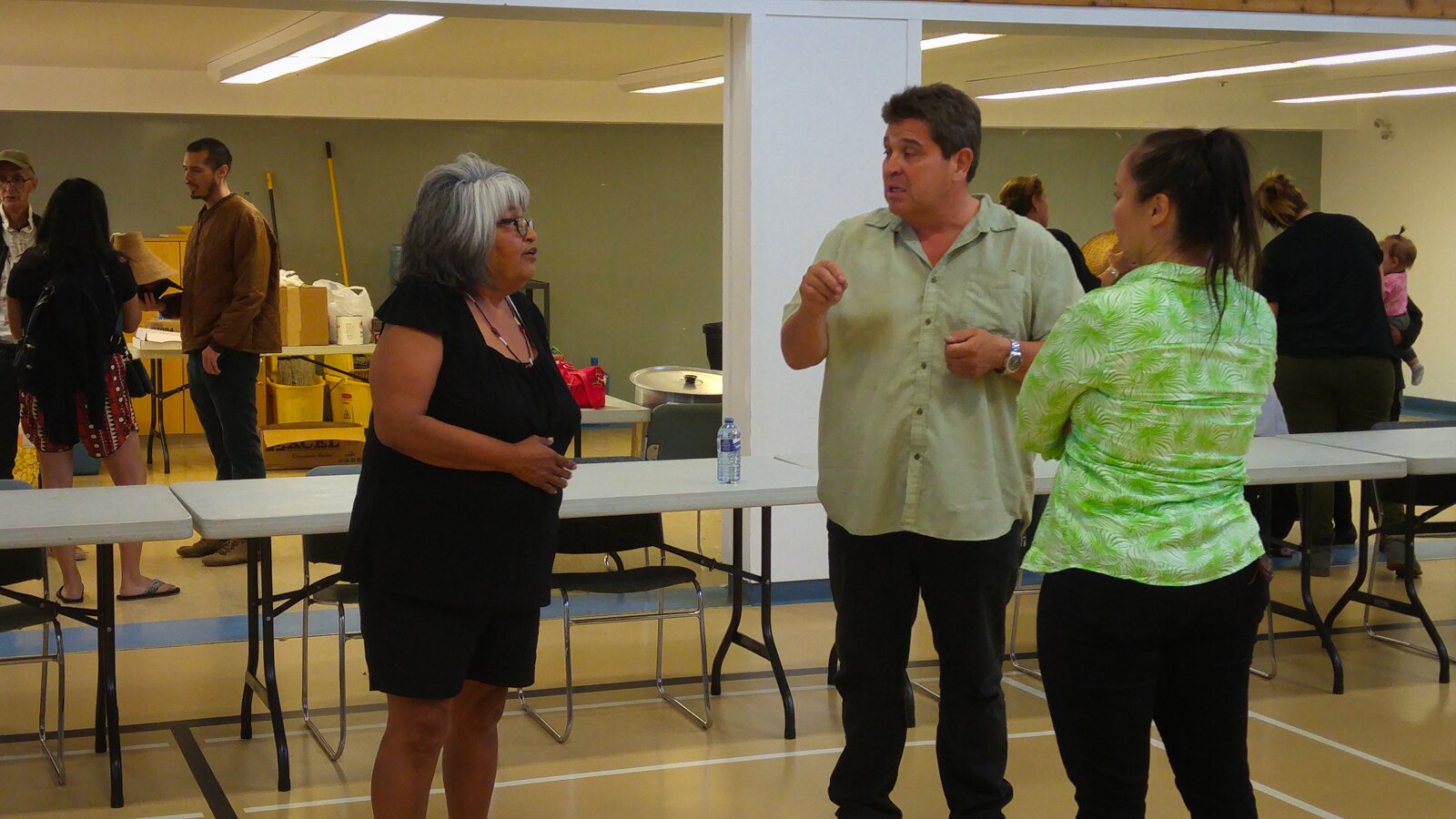
Organizing the clan
With proof in hand, the clan set a date and began preparing for the biggest potlatch in recent history. Preparing a ceremony with enough food and gifts for more than 500 people in less than six weeks was no simple task, but that’s what clans are for.
“We all come out of the woodwork,” said Crystal Robinson, Swanson’s sister, a clan matriarch or “woman of high esteem.”
“Everybody’s at task doing something to contribute something to the event. We have committees for the hall setup, the dance groups and the food distribution. There’s a lot of people at play,” she said.
While the planning was going on, tensions ran high. Just two days before the big event, Swanson was served a letter from the McConchie Law Corporation on behalf of Goertzen and Ingram, accusing Swanson of defamation. They demanded a written apology and that Swanson cancel any plans to take away Goertzen’s and Ingram’s statuses as hereditary chiefs.
“It was a threat, a manipulation and a scare tactic to get us to stop the potlatch,” said Swanson. “But we knew that everything we said was within our clan. We didn’t publicly go out there and defame them. We felt comfortable with what we were doing. We weren’t going to let Canadian law stop Haida law.”
And so the stage was set for history to be made.
"When people show up to a potlatch that we are hosting, they are agreeing with what we are doing."
In the packed hall, there was a lull in movement shortly after everyone was seated. Hereditary chiefs from neighboring First Nations began to enter one by one. Then, more than 500 witnesses simultaneously stood as the leadership of the Yahgu'laanaas/ Jaanas marched into the house, singing a low-voiced entrance song to a slow drumbeat.
Two dancers in masks, the Raven and the Eagle, were summoned to dance the floor to begin the day-long ceremony. Swanson told the gathering that the theme of the potlatch was “Raven Always Sets Things Right” — a gesture to Haida origin stories such as the tale of the clam shell. In many northwest coast traditions, Raven is known as a trickster — playful and curious, as animated by the dancer.
Then it was time for Swanson to conduct his clan’s business.
After Swanson’s introduction, the floor was blessed by an elder. A series of opening dances was performed, ending with a peace song. Swanson told the gathering that the potlatch was not about shame. It was about rebuilding unity within the nation in the face of powerful forces coming from outside the Haida world, as well as re-establishing cultural protocol following the multigenerational impacts of residential schools and the potlatch ban.
Adorned in his chief’s regalia and headdress, Swanson declared that Ingram and Goertzen no longer represented the Yahgu’laanaas/ Jaanas, a statement that drew cheers from the crowd. He then picked up a giant copper shield, representing prestige, property and wealth, and read off an engraved text that described the duties of a hereditary chief. These include inspiring clan members, acting in their best interests, upholding traditional values, protecting the environment and, at potlatches, taking care of business and distributing wealth and ceremonial offerings.
Swanson raised the copper high above his head and danced in the centre of the house, his clan members slowly surrounding him in a powerful swirl of movement.
“We felt we had to physically show what is expected of a hereditary leader. A chief with no clan is not a chief. And we had to reiterate to everybody with something physical, and read out what is expected of a chief, for now and forever,” Swanson said.
“It made me very proud to be a Yahgu'laanaas,” said Carty. “I’ve got a very happy heart. I felt everything went well. We had a full hall of witnesses, and when people show up to a potlatch that we are hosting, they are agreeing with what we are doing,” she said.
Some members protest decision
But not all clan members agreed with the business.
“Those chieftainships belong to certain families and he didn’t have the right to step into their family’s decisions."
A group of five members danced in the opposite direction of the rest of the clan and wore their regalia inside out as forms of protest. They were quickly and quietly danced out of the hall while police watched intently close by.
Clan member Sherri Dick was not one of the protesters, nor does she support Enbridge, but she still doesn’t agree with how Swanson and his supporters ran the ceremony.
“You couldn’t speak, you couldn’t do anything. It was a very controlled atmosphere. A potlatch has never been policed by policemen and had people escorted out like that. It’s shameful and it hurts.”
Dick also says Swanson didn’t follow proper protocol to have the names removed. For a chief to make a decision, she says, he must take direction from all the matriarchs of the clan who follow the wishes of the clan members. Dick says Swanson had support from some but not all of the necessary matriarchs to strip the name from Goertzen in particular. “Those chieftainships belong to certain families and he didn’t have the right to step into their family’s decisions.”
“There’s a lot of broken hearts over what happened,” says Dick.
Meanwhile, Goertzen and Ingram were not formally invited to have their say at the potlatch. Another Haida hereditary chief, who would only speak to Discourse Media on the condition of anonymity, says the business should not stand. “Those two guys are still hereditary chiefs. The clan didn’t bring them in the house.”
But the elected president of the Council of the Haida Nation applauded the clan’s decision.
“Not for a moment did I think there was any wavering off in the Enbridge battle. But something happened along the course that I can’t even explain,” said an emotional Peter Lantin, who has also been threatened by Ingram and Goertzen with a defamation lawsuit. “I can’t speak for these people and the decisions that they’ve made. But it changed everything.”
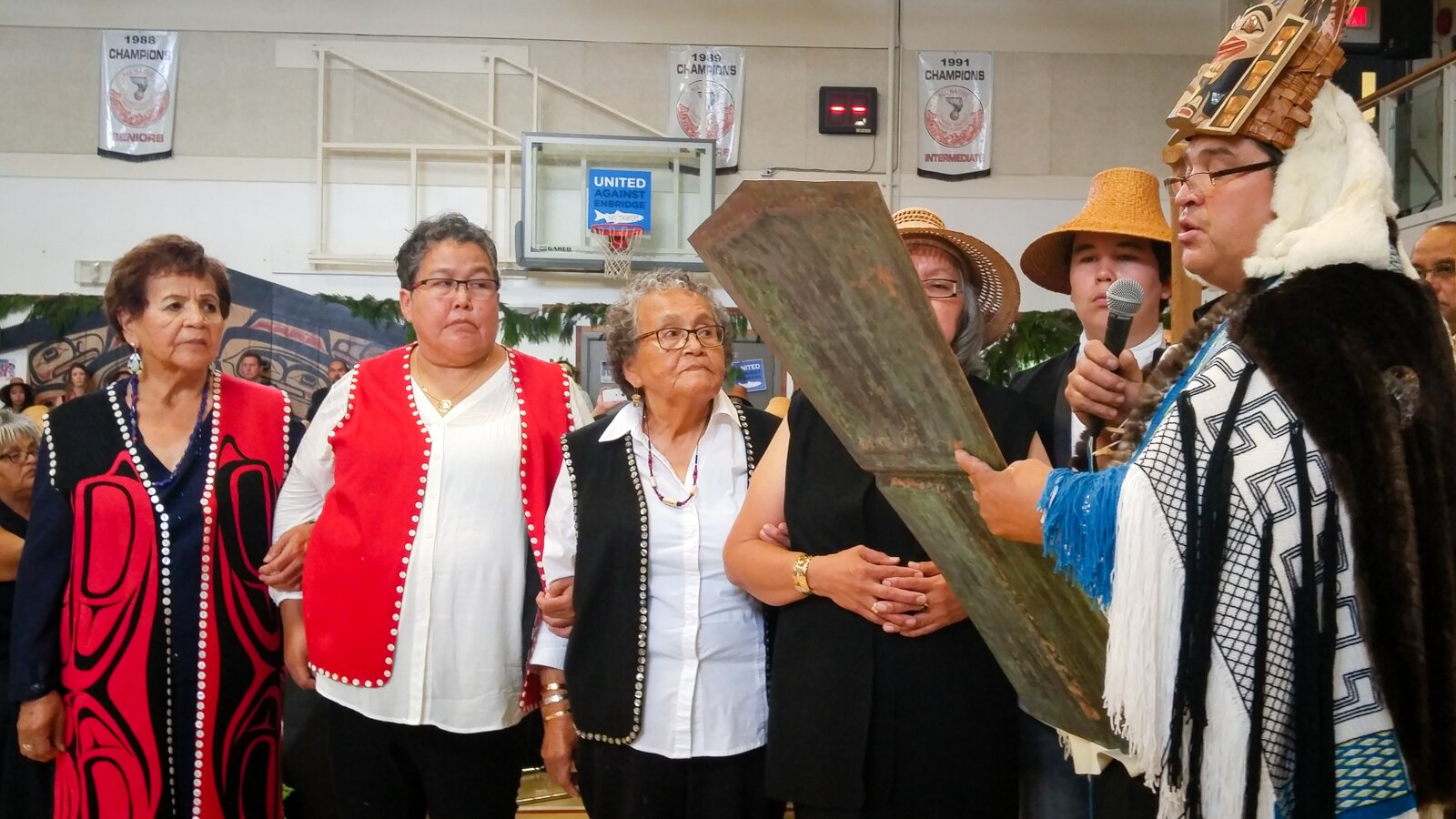
Moving forward
Speaking to the crowd toward the end of the potlatch, Lantin said the only way to move forward as a nation is to reunite, “steady the canoe” and continue to re-establish cultural protocol. “There’s always going to be a fight. It’s not going to end with this council. It’s not going to end with the next council. But in order for this to work, our hereditary governance has to be properly functioning,” he said.
The potlatch comes just a couple of months after the Haida celebrated a victory when the Federal Court of Appeal overruled the Northern Gateway pipeline’s approval. The court found that the federal government had failed to fully consult with seven First Nations that would be directly affected if the project went through.
“We’re winning this thing. We’re going to continue to win this thing. It’s going to be okay,” said Lantin.
So what now? The ceremonial business is done, but complex questions remain. Goertzen and Ingram are considering legal action and some still view them as hereditary chiefs. Swanson and the rest of the Yahgu'laanaas/ Jaanas are moving on as if they are not. One side is pushing for economic development, employment and training opportunities in an industry loathed by many vocal opponents. The other is re-establishing the cultural protocols of hereditary governance in hopes of protecting the environment.
“We weren’t going to let Canadian law stop Haida law.”
While the fight against Enbridge appears to be all but over, the Haida now face perhaps their greatest fight of all: the fight for unity, and the struggle for internal reconciliation.
The day after the potlatch, clan members returned to clean the hall. As the dust settled on a historic day, clan matriarch Crystal Robinson sat in her home and contemplated the future of the Haida Nation. When asked about Ingram and Goertzen, she said they may have lost their chief names, but no one is ever banished from the clan. Family is family.
“It hasn’t been an easy process,” said Robinson. “But we are healing people. We forgive no matter what.”
And they believe that in the long run, the Raven will set things right.
What do you think about this story?
Join the conversation on Facebook.
